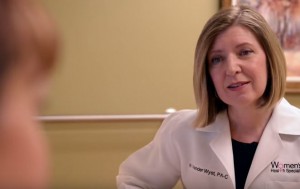 Quite often we receive questions from young women or their mothers about when they should come in for their first gynecological appointment. “It’s really a wellness opportunity that’s ideally scheduled before a young woman becomes sexually active,” says Wanda Vander Wyst, PA-C. “It provides a chance for conversation where reproductive health topics can be openly discussed and answered.”
Quite often we receive questions from young women or their mothers about when they should come in for their first gynecological appointment. “It’s really a wellness opportunity that’s ideally scheduled before a young woman becomes sexually active,” says Wanda Vander Wyst, PA-C. “It provides a chance for conversation where reproductive health topics can be openly discussed and answered.”
“The purpose of the visit is really for women to gain more information, whether that’s about birth control options, contraceptive counseling or how to prevent STDs,” commented Wanda. “It’s also a good opportunity to discuss menstrual cycles and problems, such as irregular cycles, heavy flow, cramping or symptoms of infection.”
Women can expect to have their height, weight and blood pressure recorded at their office visit. Patients will provide information such as medications they’re taking, any allergies, immunization history, personal and family medical history, date of last menstrual period and any related facts or details about individual concerns. An annual well woman visit also includes a breast exam. The pelvic portion of a typical gynecological exam consists of:
- Examination of the outer genitalia
- Vaginal and cervix examination with a speculum
- Internal exam to check uterus and ovaries, where the provider places one or two gloved fingers into the vagina and their other hand will press on the abdomen from the outside.
The pelvic exam is often short, but is an important part of checking for potential problems. “Pap screening begins at age 21, but often we see young women at earlier ages for a gynecological visit to address their questions and any problems they are having,” noted Wanda. In discussing a patient’s questions or concerns, your health care provider will determine if an examination is needed. An exam is done when necessary, but at times a visit may be just talking between you and your provider.
“It’s normal to be a little nervous before your first gynecological exam, which is why it’s important to find a provider that you feel comfortable with,” says Wanda. “After all, you want to be able to build a lasting, positive relationship with your OB/GYN for all of your needs as they change; from menstrual management, contraceptive needs, to pregnancy and menopausal management. We want to be an available resource to you, whatever your needs may be. “